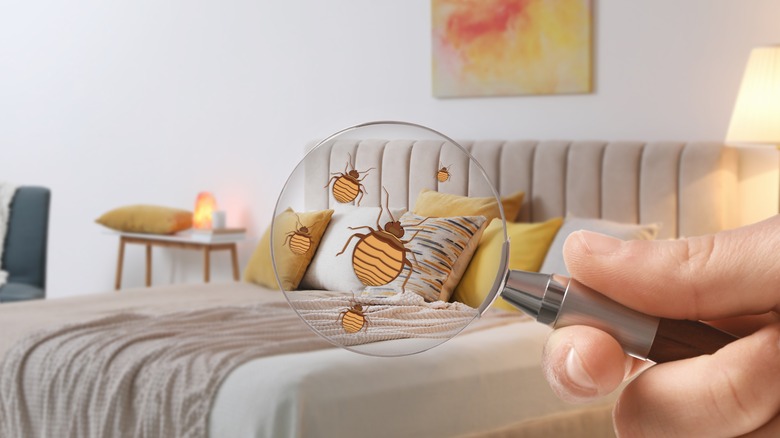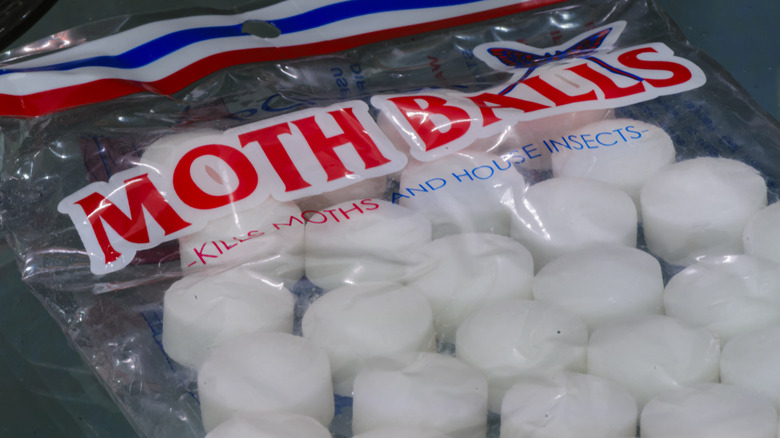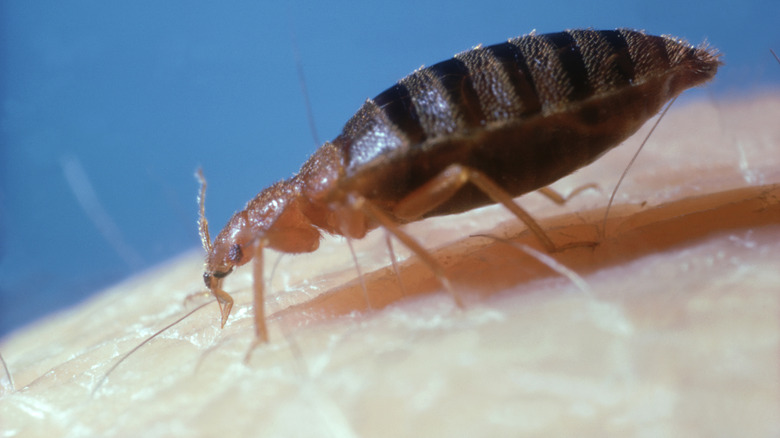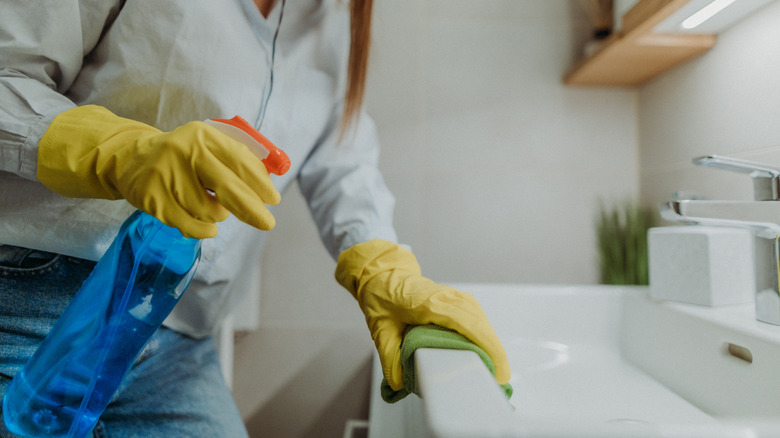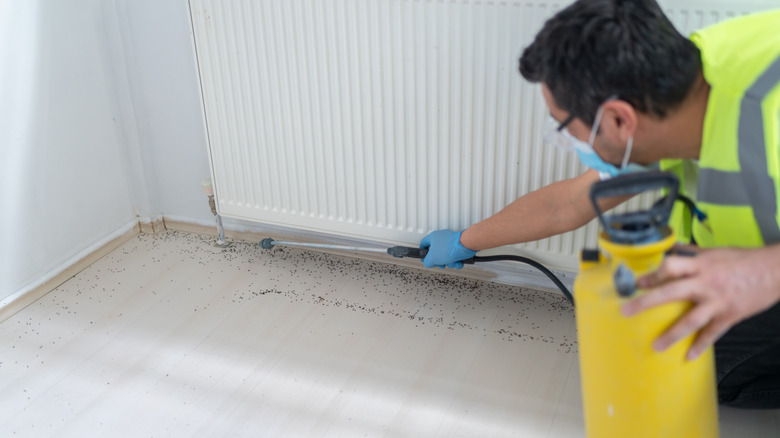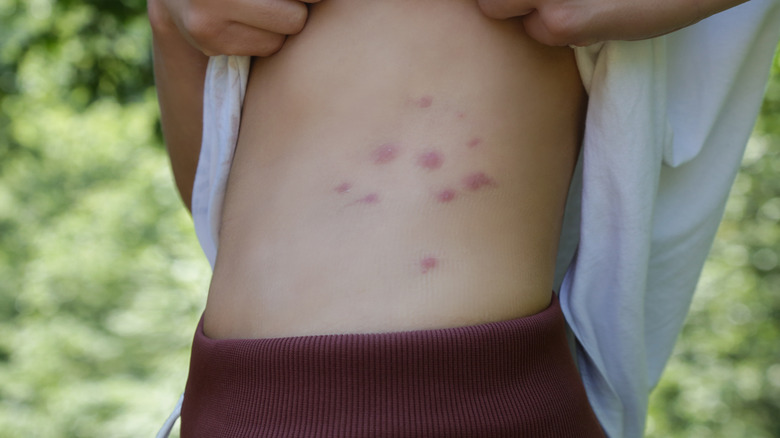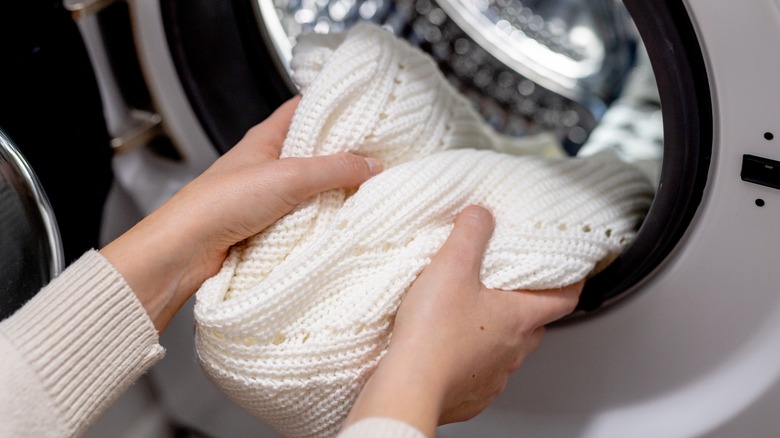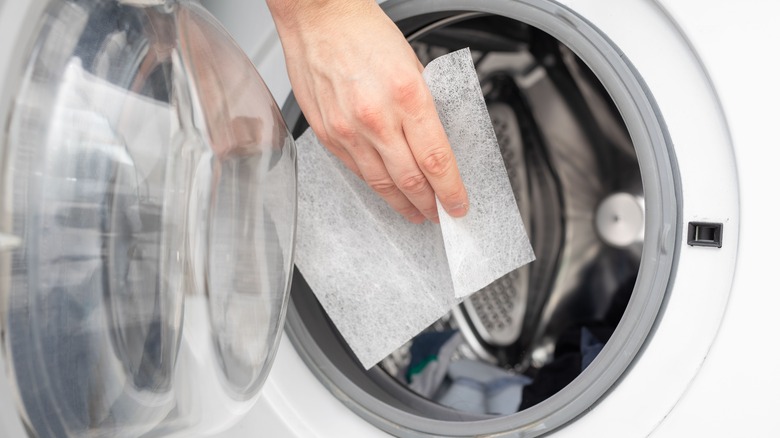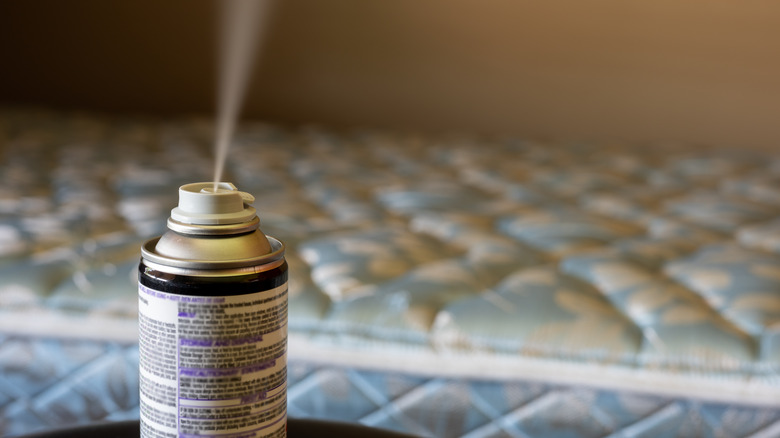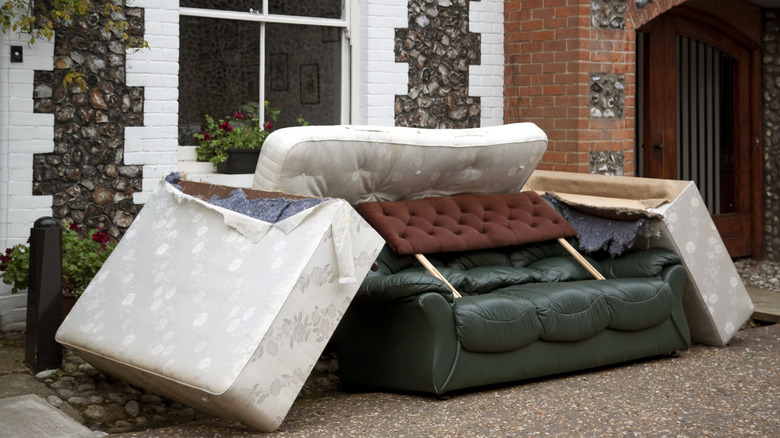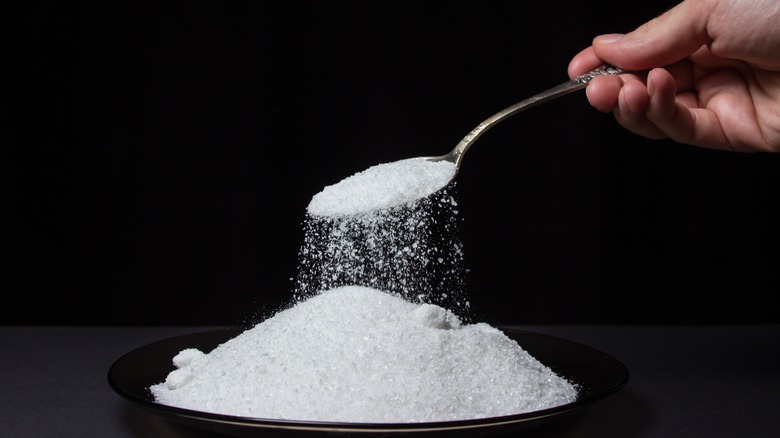Avoid Trying Any Of These Tricks To Get Rid Of Bed Bugs
Bed bug bites are some of the itchiest bites you might ever feel — and you never seem to just have one or two of them. Bed bugs are famous for covering innocent sleepers in red welts, only to disappear back into the bed each morning. They are notoriously difficult to get rid of. Unfortunately, there is a lot of false information out there about how to exterminate bed bugs from your home. You have to approach bed bugs differently than any other pests. Their food preferences and lifecycles are not the same as, say, termites or ants, so knowing how to get rid of those doesn't necessarily mean you will know how to get rid of bed bugs.
You might feel despair going through this list, as every method you thought worked for getting rid of bed bugs actually doesn't. However, you don't need to worry. To succeed in ridding your house of these bugs, you need to stick to things that actually kill them, like isolating them from the rest of your belongings and killing them off with high heat. Our experts have also put together a full list of the best ways to get rid of bed bugs so you can win your battle against these hard-to-vanquish pests. But before you get started on your journey, make sure you know all the ways that don't work so you can avoid them.
Mothballs only kill moths, not bed bugs
You might have a few mothballs around your house and think you can use them to kill bed bugs. If you aren't familiar, mothballs are small pellets containing chemicals like naphthalene or paradichlorobenzene. They kill pests that damage fabrics by releasing a strong odor. Mothballs can be dangerous to humans and pets if ingested or inhaled too much. Unfortunately, none of this danger seems to transfer over to bed bugs.
Some corners of the internet advise that you can put mothballs in the crevices of mattresses and other furniture that has bed bugs. The idea is that the chemicals that work to kill moths will also kill bed bugs in the same way. However, researchers at Rutgers University put this hack to the test to make sure and confirmed it doesn't work. They put bed bugs inside plastic bags filled with clothes and mothballs and left them there for a week. At the end of the week, about half of the bed bugs were dead (perhaps due to lack of oxygen). However, the eggs were fine — leading the researchers to encourage consumers not to use this method.
Starving the bugs can take up to a year
If bed bugs can't feast on blood, they will eventually starve to death. So you might think that to rid your home of bed bugs, you can take this route. If they are in your clothes, bedding, or even an upholstered chair, you might assume that you can simply shut the door and let them die. Unfortunately, the bed bugs will typically outlast this method.
Although there is a little bit of disagreement in the scientific community about the exact length of time the pests can go without eating, the consensus is that bed bugs can typically last up to three months without food. That's a long time to go without using an entire room in your house. Even if you can commit to this, you would have to factor in more time for the bed bugs that were not yet born when you started. Although the bugs do not reproduce quickly, they still lay enough eggs that you would need to consider this. Plus, if you live somewhere that is cold, bed bugs have been known to last even longer. They are cold-blooded animals, so when the temperature dips, their metabolism allows them to go up to a year without eating. That's too long to have a pest problem!
Keeping your home extra clean won't do much
You might think that to keep bed bugs out of your space, you need to spend hours cleaning. After all, other bugs like roaches, flies, and even ants typically show up inside because there is plenty of food for them. Unfortunately with bed bugs, you are the food. They only survive off the blood they draw when they bite you, not from crumbs like other pests. So you can scrub the floors with bleach and wipe off the countertops every night. You can even change your sheets to fresh ones daily. All of this and it still won't be enough to get rid of bed bugs.
"While cleaning up and getting rid of clutter can help treat bed bugs faster, bed bugs can live anywhere, even places we would consider clean and tidy," Jeff Zimmerman, owner of a bed bug extermination company, told Business Insider. This is why you can deal with a bed bug infestation in your immaculate home. You can even pick up bed bugs in five-star hotels. So, keeping your home tidy will likely make it easier for you to find the bed bugs as they will stand out on a clean floor or bare bed — it won't get rid of them.
Bed bugs can resist most pesticides
With most other pests, your local hardware store would sell a spray that will blast them into oblivion. You simply need to mist the wasps' nest or cover the ants in a chemical. With bed bugs, it's not so simple — so don't get tricked into shelling out big bucks for bed bug chemicals to get rid of them. "Relying strictly on chemicals is generally not a good solution," Coby Schal, an entomologist at North Carolina State University in Raleigh, told Scientific American about solving the pest problem.
The bugs are resistant to a lot of chemicals, so it's not worth it to try ones just because they work on other insects. In fact, even one of the strongest chemicals DDT which was banned from public sale in the 1970s, doesn't do much to the bugs, Schal said. They were already not dying from it way back then and it's unlikely that even if you were to get your hands on some today that it would work. While you might be able to have a small amount of success with pesticides, most experts agree that it should be a small part of your strategy and you can't rely on them to get rid of all of the bugs.
Extreme cold won't do much to a bed bug
If you are thinking about freezing your bed bug problem away, it won't work. While you might have heard rumors that cold weather or even flash-freezing will kill the pests, it won't. In fact, bed bugs are cold-blooded creatures that tend to do better when it's cooler out. Their metabolisms slow down and they can last longer without eating.
If you really want to get rid of bed bugs, you can't rely on cold. You have to reach for the opposite resource: heat. If bed bugs are infesting smaller items like pillows, blankets, or even backpacks, you can pop them in the dryer and nuke them. However, mattresses and embroidered furniture are a bit harder to take care of. "That's why we recommend using a bed bugs heater," Zimmerman told Business Insider. "They are eco-friendly, efficient, and 100% effective at killing bed bugs." These are a special type of heater, not just a regular space heater. If you don't want to purchase a heater specifically to rid your home of the bugs, most pest control companies provide packages that use one on more of a rental basis.
Drowning a bed bug is more work than you might think
Bed bugs tend to hide themselves in any cloth or cushion. So contrary to their name, they are not only hanging out in beds. So you might have a larger amount of things to get them out of than you first thought. You might think that by washing your linens and cushions over and over again, you are simply drowning the bed bugs, but that is not true. It's the high heat of the wash cycle that tends to kill the pests, not the water. In fact, drowning a bed bug is actually a lot harder than you might realize. Scientists from the University of Sheffield in the UK determined the exact water temperatures needed to kill a bed bug to be 140 degrees Fahrenheit (via Insects in the City). The cycle needed to be at least 30 minutes long to kill adults, nymphs, and eggs.
The same study found that if you leave your linens in cold water (with the intent to drown them) for at least 24 hours, the adults and nymphs are likely to perish. However, being immersed in the cooler water did nothing to harm the eggs. So, unfortunately, with this method, the bugs would go on to hatch and start the cycle over again. It's best to rely on heat and avoid water on its own.
Dryer sheets aren't enough to kill them
You might have heard about a hack where you place dryer sheets around a room infested with bed bugs to get rid of them. Unfortunately, this hack doesn't work at all. Researchers at Rutgers University studied the impact of using dryer sheets on a couch that had bed bugs living inside. The team removed the cushions and placed the sheets all over the seat, leaving little space for the bugs to move around.
It can be assumed that the bugs might have not liked the smell, as dryer sheets are typically scented. It can also be thought that those who use this hack hope the static-drawing nature of the sheets will trap the bugs. Unfortunately, neither worked. The results of the study indicate that the bed bugs were fine and ignored the dryer sheets. So, don't waste your time or effort trying to clear up your infestation this way. In most cases, it's better for your home and sanity to simply dispose of a couch or mattress that has bed bugs instead of trying to save them. Be sure to tear it up and label it as infested, however, so no one else takes it home and starts the cycle again.
Foggers do absolutely nothing to the bugs
Fogging is a common name for releasing chemicals in your home to kill bugs. The pesticides in bug bombs are released into the air, creating a fog that kills bugs in direct contact with the spray. However, this isn't the safest method to rid your home of bugs if you are untrained. Overexposure to insecticides can cause problems with your lungs and make you dizzy. Plus, it can harm your pets, too. The worst part is that researchers at Rutgers University cite a study claiming that these chemicals don't work on bed bugs.
Just as the pests seem to be resistant to sprays, mists, or powders — fog also doesn't kill them. In fact, those conducting the study set off at least nine fogging bombs in an apartment infested with bed bugs. It only had one room, so the layer of fog was thick and the bugs didn't have many places to go. Unfortunately, all of the fog did nothing to kill the bugs. They were just fine. So, it's not worth it to try to fog the bed bugs away, as you are far more likely to burn or poison yourself (or your pets) than get rid of the bugs at all.
Tossing out your mattress and stopping at that
If you bring bed bugs home from your travels, you might be tempted to just throw away your mattress and be done with it. However, this trick doesn't really work as researchers are quick to remind us that the bugs have likely already spread. The bugs are probably living in your headboard (if it has any fabric on it) as well as your boxspring. If your bedroom is carpeted, the bugs have made their way into it. They are nesting in your chair, your couch, etc. Anywhere that they can be close to their food source (you!), they will sleep.
So, instead of just throwing out your mattress (which is a good idea if it's old anyway — just be sure to mark it as infested), consider casing it in a bed bug barrier as a part of a complete treatment plan. Bed bugs cannot chew through the plastic, so if you bring in a new mattress, it's best to hide it inside the cover so any leftover bugs cannot infest your new mattress. In all, throwing out your mattress is a great step to getting rid of bed bugs, but it's not the only one you can take if you really want to succeed.
Bed bugs don't like lavender, but it won't kill them
While bed bugs don't necessarily like lavender, it won't kill them or deter them. Members of our team have tested this method. When they woke up covered in bed bug bites in an Australian hostel, they followed the recommendation of the receptionist and sprayed their bed and belongings with lavender essential oil. Unfortunately, they woke up the next morning covered in even more bed bug bites.
Studies show that options like geraniol, eugenol, carvacrol, and citronellic acid have the potential to keep bed bugs out of your stuff while you are traveling (via Insects/Multidisciplinary Digital Publishing Institute). This will help you get rid of them because you never bring them home with you in the first place. However, many corners of the Internet swear that lavender oil does the trick. Unfortunately, there isn't much evidence that it works. The only thing that lavender actually seems to be good for is soothing bed bug bites after you get them. This is certainly nice, but it's not going to do anything to get rid of an infestation.
Salt doesn't actually kill the bugs
There is a common myth floating around online that you can use salt to kill bed bugs. The idea is that the salt will dehydrate the bugs. However, bed bugs do not drink water — only blood. So ingesting salt will not dehydrate them. Sprinkling table salt on bed bugs may occasionally kill a few, but it is not an effective solution for an infestation.
Mixing salt with water to create a spray also does not affect bed bugs because they won't drink it and it doesn't seem to impact their skin at all, unlike pests like snugs or snails. Epsom salt has the same issues as regular table salt. However, we think this rumor originally gained traction because sprinkling Epsom salt on bed bug eggs can dry them out and prevent them from hatching. This isn't the best trick to get rid of the pests, though — as you typically don't see bedbug eggs. The most common sign of the pest is the waste and blood splatters they leave behind.
